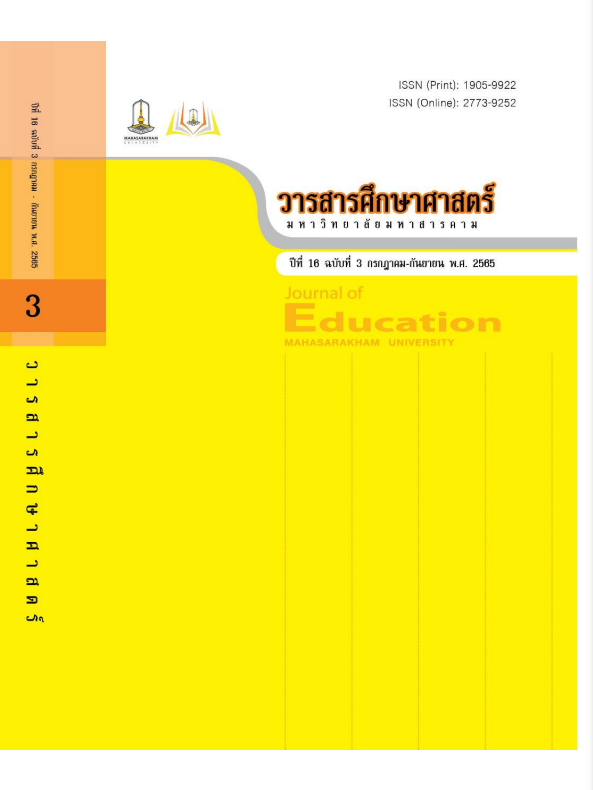The Development of Mathematical Concepts of Mathematics Teacher Students Using CCR Concept
Main Article Content
Abstract
The objectives of this research were 1) to study the mathematical conceptual level of mathematics teacher students, Faculty of Education, Phetchabun Rajabhat University. Before and after learning management using CCR concept 2) to study the guidelines for the development of mathematical concepts of mathematics teacher students, Faculty of Education, Phetchabun Rajabhat University. The sample group is bachelor’s degree students. Department of Mathematics, Faculty of Education, Phetchabun Rajabhat University, total of 10 students enrolled in EDMA201 course content analysis of mathematics learning subject 1 in the first semester of the academic year 2020. The research instruments consisted of a learning management plan using the concept CCR, math concept test and an interview form about the development of mathematical concepts. The statistics used to analyze the data were mean, standard deviation and relative gain score and the interview form was analyzed using content analysis.
The findings were as follows: 1) before receiving the learning activities using the CCR concept, the mathematics teacher students had a mathematical concept at a moderate level. And after receiving learning activities using CCR concept, mathematics teacher students have a mathematical concept at a very good level. 2) the guidelines for the development of mathematical concepts of mathematics teacher students were to use the concept of intellectual education to practice meditation before studying. Review what you already know, don’t know, and want to know. using research-based learning management to enable students to practice thinking on their own, practice problem solving, study and research information and create a body of knowledge by oneself correctly, working together as a group discussed together where the instructor acts as a coach help students, ask to motivate students, suggest ways to solve problems for students reflect on what has been learned each time through cognitive education activities.
Downloads
Article Details

This work is licensed under a Creative Commons Attribution-NonCommercial-NoDerivatives 4.0 International License.
References
มโนทัศน์ทางคณิตศาสตร์ แนวคิด CCR นักศึกษาครูคณิตศาสตร์
Mathematical concept, CCR concept, mathematics student teacher
จักรพงศ์ พรมคำ. (2562). การพัฒนามโนทัศน์ทางคณิตศาสตร์ เรื่อง สถิติ โดยใช้จิตตปัญญาศึกษาและโมเดลการสร้างมโนทัศน์ของลาสเล่ย์และแมทซีนสกี ของนักเรียนชั้นมัธยมศึกษาปีที่ 1. วิทยานิพนธ์ ค.ม., มหาวิทยาลัยราชภัฏมหาสารคาม, มหาสารคาม.
พรธิดา สุขกรม และอัมพร ม้าคนอง. (2557). การศึกษามโนทัศน์ที่คลาดเคลื่อนและข้อผิดพลาดทางคณิตศาสตร์ของนักเรียนชั้นมัธยมศึกษาปีที่ 5 ในโรงเรียนสังกัดสำนักงานเขตพื้นที่การศึกษามัธยมศึกษาเขต 1 และเขต 2. วารสารอิเล็กทรอนิกส์ทางการศึกษา, 10(4), 599-611.
พัชรพรรณ เก่งการเรือ ทรงศรี ตุ่นทอง และเนติ เฉลยวาเรศ. (2561). ผลการจัดการเรียนรู้ด้วยวิธีการโค้ช เรื่อง จำนวนและการดำาเนินการ กลุ่มสาระการเรียนรู้คณิตศาสตร์ เพื่อพัฒนาทักษะการเรียนรู้ในศตวรรษที่ 21 ด้านการคิดอย่างมีวิจารณญาณและการแก้ปัญหา ของนักเรียนชั้นประถมศึกษาปีที่ 3. วารสารลวะศรีมหาวิทยาลัยราชภัฏเทพสตรี, 2(1), 57-68.
ไมตรี อินทร์ประสิทธิ์ และคณะ. (2546). การปฏิรูปกระบวนการเรียนรู้วิชาคณิตศาสตร์ในโรงเรียนโดยเน้นกระบวนการทางคณิตศาสตร์. ขอนแก่น: ขอนแก่นการพิมพ์.
ยุพิน พิพิธกุล. (2530). การสอนคณิตศาสตร์. กรุงเทพฯ: จุฬาลงกรณ์มหาวิทยาลัย.
วิจักขณ์ พานิช. (2550). การเรียนรู้ด้วยใจอย่างใคร่ครวญ: การศึกษาดั่งเส้นทางแสวงหาทางจิตวิญญาณ. กรุงเทพฯ: สวนเงินมีมา.
วีณา ก๊วยสมบูรณ์. (2547). การพัฒนากระบวนการชี้แนะทางปัญญาเพื่อส่งเสริมการพัฒนาปรัชญาการศึกษาส่วนบุคคลของครูประจำการระดับประถมศึกษา. วิทยานิพนธ์ ค.ด., จุฬาลงกรณ์มหาวิทยาลัย, กรุงเทพมหานคร.
สถาบันส่งเสริมการสอนวิทยาศาสตร์และเทคโนโลยี. (2555). ทักษะและกระบวนการทางคณิตศาสตร์. กรุงเทพฯ: 3-คิว มีเดีย.
สมพร พลขันธ์ สมทรง สุวพานิช และอรุณี จันทร์ศิลา. (2556). การวิเคราะห์มโนทัศน์ที่คลาดเคลื่อนทางการเรียนคณิตศาสตร์ เรื่อง ความรู้เบื้องต้นเกี่ยวกับจำนวนจริง ของนักเรียนชั้นมัธยมศึกษา ปีที่ 2. วารสารมหาวิทยาลัยราชภัฏมหาสารคาม, 7(2), 183-192.
สลักจิต ตรีรณโอภาส. (มปป). จิตตปัญญาศึกษากับการจัดการเรียนรู้. สืบค้นเมื่อ 9 กันยายน 2563, จาก http://edu.psru.ac.th/2011/pdf/Jitta.pdf.
สุธีระ ประเสริฐสรรพ์. (2555). โครงงานฐานวิจัย: กระบวนการเรียนรู้ใหม่ของการศึกษาไทย. กรุงเทพฯ: สำานักงานกองทุนสนับสนุนการวิจัย (สกว).
สุบิน ยมบ้านกวย. (2559). ผลการเรียนรู้วิชาคณิตศาสตร์ เรื่อง การสำรวจความคิดเห็นของนักเรียนชั้นมัธยมศึกษาปีที่ 6 โรงเรียนสาธิตมหาวิทยาลัยศิลปากร อำาเภอเมืองนครปฐม จังหวัดนครปฐม โดยใช้การวิจัยเป็นฐาน. วารสารอิเล็กทรอนิกส์ Veridian มหาวิทยาลัยศิลปากร (มนุษยศาสตร์สังคมศาสตร์และศิลปะ), 9(3), 83-96.
เสวภา วิชาดี. (2554). การศึกษาในกระบวนทัศน์ใหม่: การเรียนโดยใช้การวิจัยเป็นฐาน. Executive Journal มหาวิทยาลัยกรุงเทพ, 31(3), 26-30.
อัมพร ม้าคนอง. (2546). คณิตศาสตร์: การสอนและการเรียนรู้. กรุงเทพฯ: จุฬาลงกรณ์มหาวิทยาลัย.
อัมพร ม้าคนอง. (2552). การพัฒนามโนทัศน์ทางคณิตศาสตร์โดยใช้โมเดลการได้มาซึ่งมโนทัศน์และคำาถามระดับสูง. วารสารครุศาสตร์, 37(3), 1-13.
อัมพร ม้าคนอง. (2557). คณิตศาสตร์สำหรับครูมัธยม. กรุงเทพฯ: จุฬาลงกรณ์มหาวิทยาลัย.
Brown. (1992). Using examples and analogies to remediate misconceptions in physics: Factors influencing conceptual change. Journal of Research in Science and Teaching, 29(1), 17-34.
Mink, O.G., Owen, K.Q. & Mink, B.P. (1993). Developing high performance people: The art of coaching. Reading, Massachusetts: Addision-Wesley.
Schoenfeld. (1992). Learning to think mathematically: Problem solving, metacognition, and sense making in mathematics. In D. A. Grouws (Ed.), Handbook of Research on Mathematics Teaching and Learning, (pp.355-358). New York: Macmillan.


